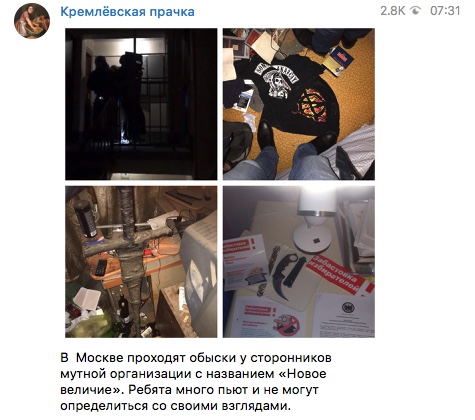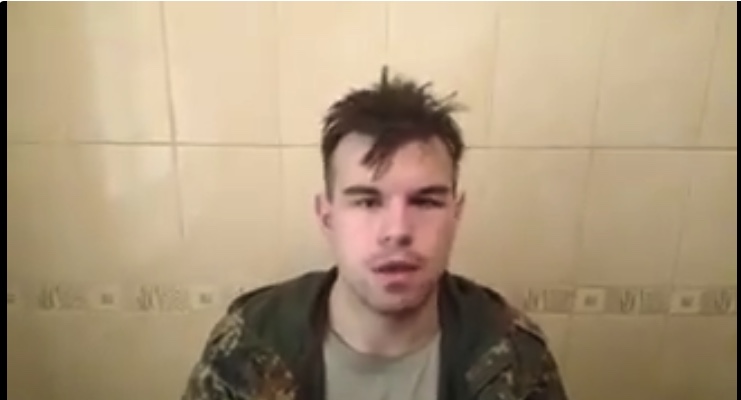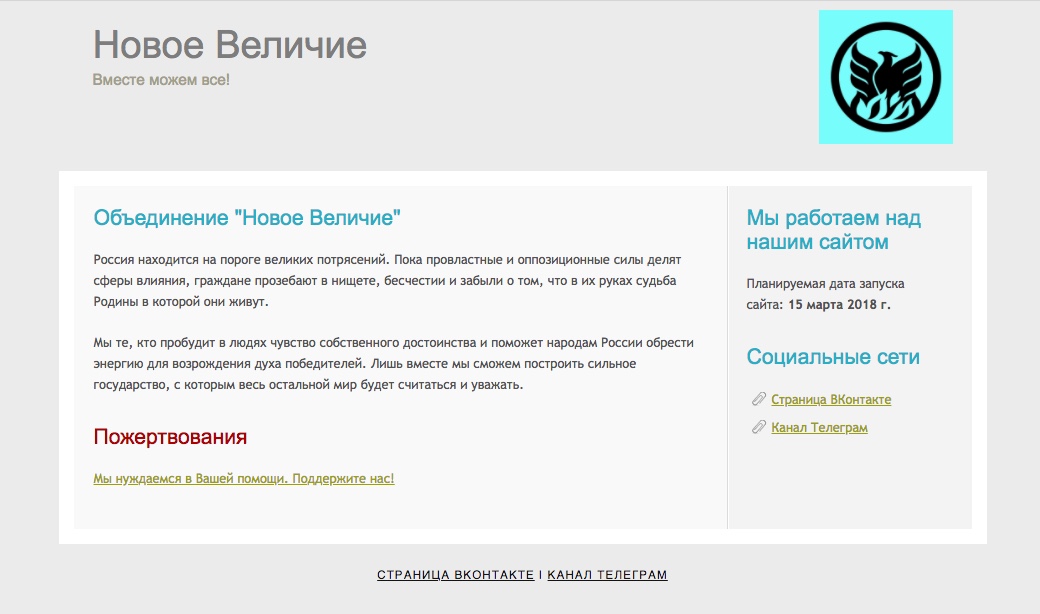Arrests Made in the New Greatness Case in Moscow
Grani.ru
March 15, 2018
Arrests and searches have been made in Moscow in the investigation of the New Greatness movement. The first source to report the news was Kremlin Washerwoman, a Telegram channel associated with the security services. More detailed information was soon published by OVD Info.
The detainees included the movement’s leader, Ruslan Kostylenkov, and two female activists, Maria Lapina and a juvenile whose name has not been disclosed. They were taken to the Kuntsevo Interdistrict Office of the Russian Investigative Committee. The female juvenile detainee was escorted by her father.
It is reported that during one of the searches a list containing the names of ten members of the movement was confiscated. According to uncorroborated reports, FSB investigators were present during the search.
There is information the juvenile detainee had earlier been subjected to pressure from Center “E” (Center for Extremism Prevention), after which her employer demanded she quit her job.
Photos of the search, as published on Kremlin Washerwoman, show campaign material for the so-called Voters’ Strike, a leaflet printed with New Greatness’s platform, and a t-shirt emblazoned with anarchist symbols.

Screenshot from the Telegram channel Kremlin Washerwomen. “Searches taking place at the home of supports of an obscure organization by the name of New Greatness. The guys drink a lot and cannot pin down their views.”
After lunch, Kremlin Washerwoman posted a video showing Kostylenkov’s confession. Out of breath, Kostylenkov recites a memorized text, mentioning in particular plans for “organizing a tribunal for members of the ruling elite” and “practice in shooting and throwing Molotov cocktails.”
 Screenshot of Ruslan Kostylenkov’s alleged confession. Courtesy of Grani.ru’s Twitter account
Screenshot of Ruslan Kostylenkov’s alleged confession. Courtesy of Grani.ru’s Twitter account
The movement’s website contains only a home page featuring a notification that the site would be launched on March 15, that is, today. It also contains a brief, two-paragraph description of the movement’s objectives.
“We are the ones who will awake a sense of their own self-worth in people and help the nations of Russian acquire the energy for reviving the spirit of victors,” reads the text. “Only together can we build a strong country the rest of the world will respect and take into account.”
At the same time, both “pro-regime” and “opposition” forces are criticized for “divvying up spheres of influence,” while “ordinary people vegetate in poverty and dishonor, having forgotten the plight of the Motherland in which they live is in their hands.”

Screenshot of the homepage of New Greatness’s website
New Greatness began posting on its VK page on December 30 of last year. In late January, the movement encouraged people to take part in a rally demanding the preservation of trolleybus service in Moscow. The capital’s mayor has gradually been replacing trolleybus lines with bus line, which has sparked protests by environmentalists.
In February, New Greatness launched a large-scale campaign to paste anti-Putin leaflets around Moscow. The movement signaled it was in favor of boycotting the presidental election. On February 25, its activists were involved in the Boris Nemtsov Memorial March in Moscow.
On February 26, a pinned post was published on the movement’s VK page that read as follows: “Our young, ambitious, and quickly growing organization needs your help. If you are finally ready for the fight and willing to sacrifice your time and strength for the sake of our Motherland’s future by working in strong team led by an energetic leader, then join us. To do that, you must live in Moscow or Moscow Region and write to the message inbox on this page. If you cannnot help out physically, help us financially!”
The message is followed by an electronic address for transferring money.
On the evening of March 14, the Telegram canal A Copper Spills posted a message that opened as follows: “Evidence that an extremist organization has been established has been uncovered.”
The post’s author claimed Center “E” investigators in Moscow’s Southeastern District had discovered that “unidentified persons” had established “a group accessible to all [VK] users, which posted information about the creation of an informal political association whose main activity is involvement in popular insurrections, revolutionary actions, and clashes with the authorities.”
“The evidence is there, but for now we’ll keep quiet about everything else. When the times comes, we will tell all,” the author of the post concludes.
Kuntsevo is located in Moscow’s Western District, not in the Southeastern District. Besides, none of New Greatness’s posts contain calls for clashes with the authorities. In this connection, it is difficult to give an unequivocal answer to the question of whether the post on A Copper Spills had anything to do with the recent searches.
Thanks to Comrade Sammakko for the heads-up. Translated by the Russian Reader
P.S. Not that anyone much cares (I’m not trying to be smug: I really don’t get the sense there are huge numbers of people either in my reading audience, Russia or the great wide world who genuinely care about any of this), but I think we can extract three takeway lessons rom the war the Russian security services and police have unleased against grassroots activists in recent months.
1. When the director of the FSB or Putin (I forget who) said the other day the FSB had “prevented” fifty or a hundred or six thousand “terrorist attacks” last year, what they really had in mind is juvenile operations and investigations like the one described in the article above. That is, perfectly harmless young people with “funny ideas” and “informal” lifestyles are turned into “terrorist groups” with a little ultraviolence from the so-called security services.
The key is to scare, threaten or torture the harmless non-terrorists into confessing their non-guilt and signing confessions before letting them see a lawyer. Then their gooses are cooked for good, because cases concerning “terrorism” and “public safety” more generally have been removed from the remit of jurors in Russia, meaning they are tried by judges who know in advance what verdicts they are supposed to hand down.
A jury of more or less intelligent people would look at the flimsy evidence and the forced confessions and be tempted to acquit the defendants. If the Bolotnaya Square defendants, for example, had been tried by juries of their peers, I have no doubt most if not all of them would have been acquitted.
2. It has become extraordinarily dangerous to call for a boycott of the March 18 presidential election. Activists who have been calling for a boycott have painted big targets on their backs, and the authorities have spent the last few months shooting at them with increasing ferociousness. Depending on their ideological leanings, the activists have been sentenced to more or less long jail sentences or branded “terrorists,” as seems to be the case with the unfortunates described in the Grani.ru article, above.
I could be wrong, but this “minor terror” alone should be enough to discredit the election in the eyes of anyone with a conscience. By voting on Sunday, you will be saying to the authorities they can terrorize with impunity anyone who criticizes elections in Russia too vigorously and loudly, although that is exactly what needs to happen.
3. The only way to beat this racket is broad-based solidarity, but as we have seen with the accused in the Penza-Petersburg “terrorism” case and even with many of Navalny’s nominal supporters sent off to jail or beaten up for god knows what reason, people occupying different political camps are not too eager to show their solidarity.
The poor folks from the utterly harmless and helpless New Greatness movement, I am nearly certain, will elicit no solidarity or support from anyone whatsoever, except maybe the lawyers from Agora or Public Verdict, if they are lucky.
This points up the biggest flaw in the Russian grassroots democratic movement (if such a thing exists): its clannish, extremely partisan notions of solidarity. There are very few political activists who cross party lines to show their solidarity with their nominal opponents, and this is a huge, crippling problem for the anti-Putin, pro-democracy movement if it wants ever to move forward for real.
When it comes to folks like the New Greatness movement, it likely means they will be railroaded and sent off to a penal colony for ten years or twenty years without so much as anyone but their loved ones even noticing it happened.
After all, even silly, harmless people have human rights, such as the right to an attorney, the right to a proper investigation, and the right to a fair trial. TRR
Discover more from The Russian Reader
Subscribe to get the latest posts to your email.
3 thoughts on “They Jump on Anything That Moves, Part 3: The Case of the New Greatness Movement”